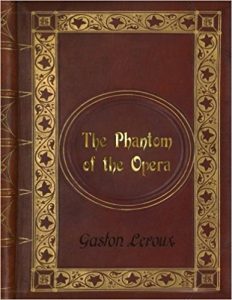Read Any Good Musicals Lately?
 There are so many beautifully written and compelling pieces of fiction in the world, I will never read them all. So I try to focus. One way I do that is to think, “What’s my tribe?” This is also helpful in choosing which Netflix or Prime series to binge on, hence, The Marvelous Mrs. Maisel is at the top of my list. Why? Because it’s about mid-20thCentury New York, and creator Amy Sherman-Palladino has a thing for playing Broadway cast albums on the soundtrack. (If you don’t know the difference between a cast album and a soundtrack, let me Google that for you…)
There are so many beautifully written and compelling pieces of fiction in the world, I will never read them all. So I try to focus. One way I do that is to think, “What’s my tribe?” This is also helpful in choosing which Netflix or Prime series to binge on, hence, The Marvelous Mrs. Maisel is at the top of my list. Why? Because it’s about mid-20thCentury New York, and creator Amy Sherman-Palladino has a thing for playing Broadway cast albums on the soundtrack. (If you don’t know the difference between a cast album and a soundtrack, let me Google that for you…)
So, yes, one of my “tribes” is “The Tribe of the Show Queens.” Now, calm down, you don’t need to be a gay man to be a show queen (although it helps). There are straight male SQs, straight and gay female SQs, and SQs of undeclared gender or orientation. Really, we’re about inclusivity, just as long as you’re an enthusiast for musical theatre, and know the difference between a cast recording and a soundtrack.
Which brings me to my reading focus: I have a habit of reading (and sometimes collecting) books that were the basis for musical theatre adaptations. Here are some obvious ones on my shelf or in my Gutenberg app: The Phantom of the Opera, Les Misérables (well, I haven’t quite finished that yet), Mame (who lost her “Auntie” when she learned to sing), Oliver! (who lost his “Twist” but gained an exclamation point), and many more.
Honestly, I would have read Auntie Mame anyway. (Patrick Dennis! Another tribe for me to focus on!) But would I have read the novels that became Lolita, My Love (yes, that Lolita), Breakfast at Tiffany’s, or Carrie? Probably yes again, actually, but maybe your actual question is: “They made a musical of Lolita? Breakfast at Tiffany’s? Carrie?” Really!?
Yes, those are three of the most notorious flops of the late 20thCentury American theatre. My Fair Lady lyricist/librettist Alan Jay Lerner and James Bond composer John Barry tried to musicalize the exploits of Nabokov’s nymphet and her step-father. The score is brilliant, but the audiences were understandably queasy. Stick to the novel, or the Kubrick film.
Bob Merrill, composer of “(How Much Is) That Doggie in the Window?” and, to be fair, lyricist for Funny Girl, tried to musicalize the story of Holly Golightly, with a first book (the talking parts, for you non-SQs) by musical comedy stalwart Abe Burrows, then a meta-theatrical revision by musical theatre virgin Edward Albee(!). Without “Moon River,” incidentally, in either version. That’s from the soundtrack. Whether with Burrows or Albee, the show flopped like a 10-ton pancake. However, thanks to this flop, Mary Tyler Moore abandoned her Broadway dreams and gave us her perfect, eponymous TV series. Thank you Messrs Merrill, Burrows, and Albee for that, and, as above, stick to the original Capote or the film.
And Carrie, so notorious that Ken Mandelbaum titled his book on Broadway flops Not Since Carrie, was a product of Fame songwriters Michael Gore and Dean Pitchford. The show has its fans, but I think, once again, the book and the film have the advantage.
What else is on my bookshelf? Bucolic fantasy in B.J. Chute’s Greenwillow, 1920s flapper bildungs-roamin’ in James Laver’s Nymph Errant, mid-century romance and unionizing in Richard Bissell’s 7½ Cents (the title of which became a song in the musicalized version, The Pajama Game), and dysfunctional family drama in Alison Bechdel’s Fun Home.
A book I’m that I’m reading now, having read James Michener’s Tales of the South Pacific a few years ago, is Jim Lovensheimer’s brilliant South Pacific: Paradise Rewritten. Lovensheimer reveals how Oscar Hammerstein created the towering musical classic out of Michener’s interconnected short stories. Highly recommended. Trivia (as if you hadn’t gotten enough of that already): both Michener’s work and South Pacific won Pulitzers. For years I searched for an unabridged Tales in second-hand bookshops, but finally settled on a recent paperback edition. Also recommended, if you have never or not recently read it. The stories are not like Michener’s later, sprawling epics at all; they’re beautifully specific and human stories that are wry, comic, and bittersweet.
What musicals have you read recently? Gentlemen Prefer Blondes? Guys and Dolls? House of Flowers? Valmouth? Kiss of the Spider Woman? Candide? Try one, and listen to the cast album, too! Oh, and there’s that biography of the guy on the ten dollar bill, by Ron Chernow, but that’s not fiction, so you might as well just see the show.
Reed Waller
Reed Vernon Waller was a winner in the short fiction contest for the Saints and Sinners Festival 2018 Anthology, and currently has two novels in progress, Trudy and Elliot and the Wondrous Merge, and Division of Magical Verification, Book 1: Who Transfigured Dirk DeLuxe?. He holds a masters degree in arts management from American University.